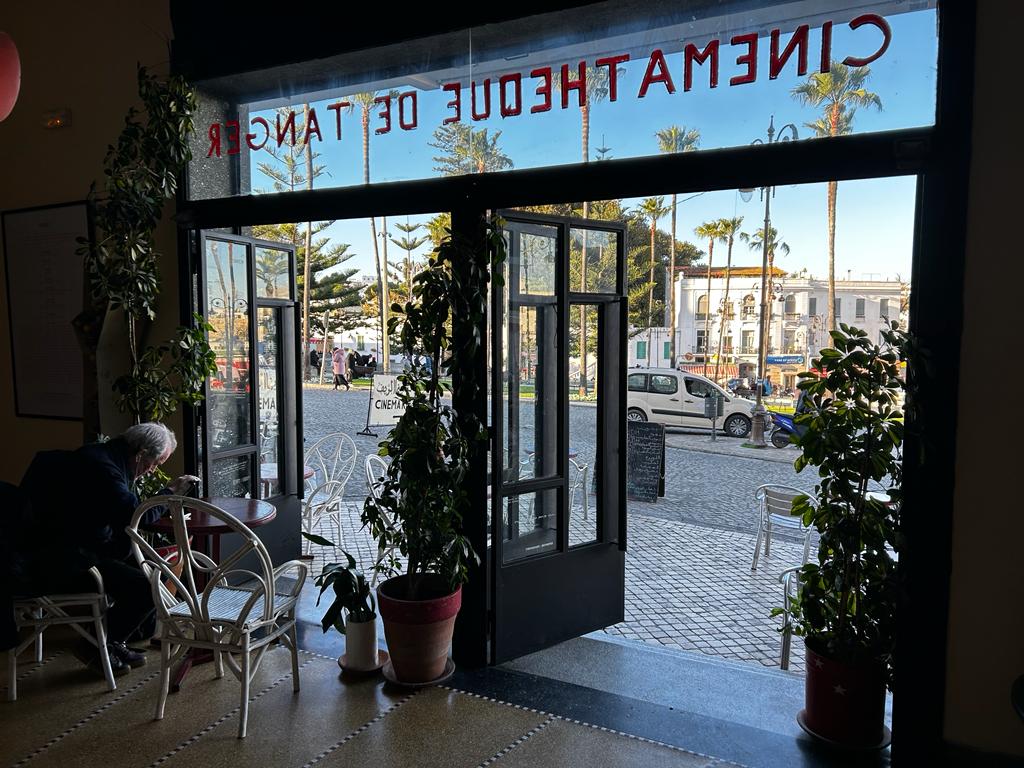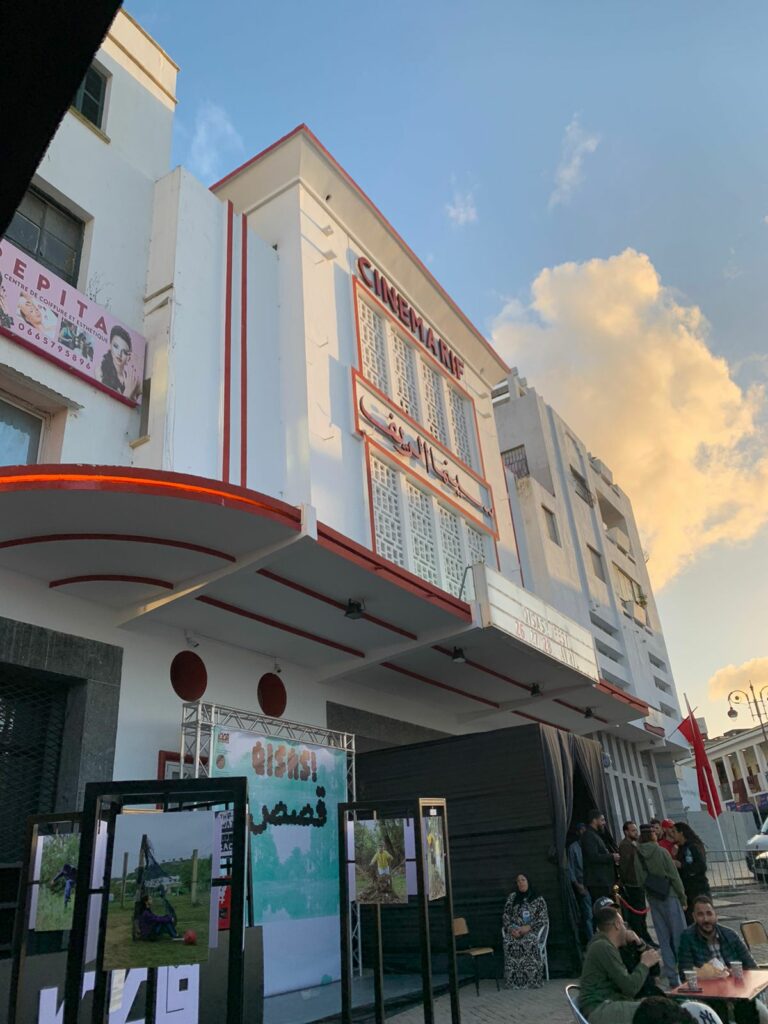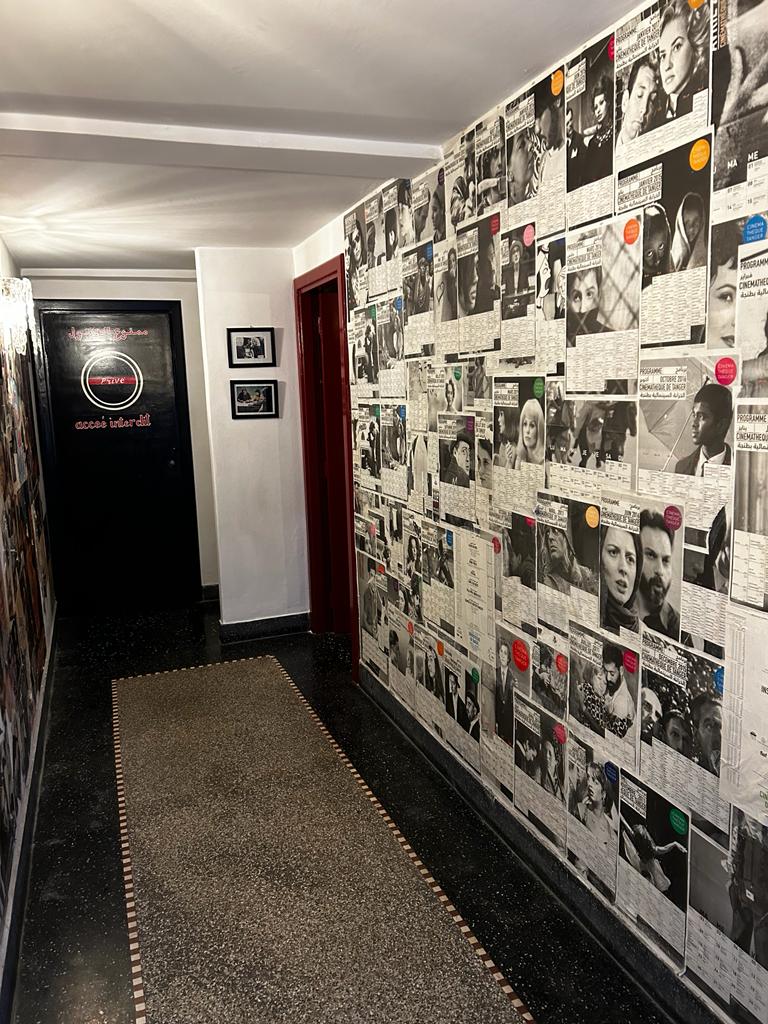Young people are the spectators of tomorrow
Interview with Malika Chaghal, Cinémathèque de Tanger
Cinémathèque de Tanger is an alternative center for film conservation and circulation based in Tangier, Morocco. Created in 2007, it is committed to promoting film heritage and production, through the collection of feature films, documentaries and experimental films, enriching its unique collection and preserving a collective memory of cinema.
Cinémathèque de Tanger has chosen to present The Mother of All Lies as part of the Cinema of Commoning Film Program, which will screen at SİNEMA TRANSTOPIA on Wednesday 22 May 2024. Ahead of that screening, we spoke to Vice President Malika Chaghal about the value of film education, the power of archives, and expanding beyond the cinema’s walls.

Introduce us to Cinémathèque de Tanger. How would you describe the type of work that you do as a cinema? What is special about your cinema space?
Cinémathèque de Tanger is managed by a non-profit association. This is important to mention because, in Morocco, most cinemas are privately managed by companies. We’ve been around since 2007.
In 2005, an association of artists took over Cinema Riff, which was on the verge of closing down like many other cinemas at the time. These artists created the Cinémathèque de Tanger Association, inaugurating the project in 2007. Initially, it was a single-screen auditorium with over 700 seats, which was later transformed into two cinemas, one with 300 seats and another with 50 seats. Now we also have two archives spaces, a consultation room and a café.
The café is also an important part of the Cinémathèque, because of our location in the main square of Tangier, The Grand Socco, which connects the old city to the new city. It is a historic square where King Mohamed V made his independence speech on the 9th of April in 1947. The Café is important for us not only as a source of financing but also as a place of social mixture and diversity, sharing, and conviviality.
The Cinémathèque operates on three main axes. The first is programming, which is central to what makes us special. We aim to program high-quality independent films, always in their original version, which is still relatively uncommon in Morocco. We screen films from all countries and genres: documentaries, short films, artist films, etc. Unlike most Moroccan cinemas that mainly show blockbusters and commercial films, we focus on diverse, high-quality programming.
The second axis is film education. When I arrived in 2012, the problem in Morocco was the desertification of the cinemas, as people were no longer going to the cinema. Film education, the work of drawing the public to cinemas, and supporting the films are solutions to this problem. We have educational programs spanning from schools to universities, and we also work with young people and associations across the city. Our efforts in the field of film education include creating educational resources, cultural animation, hosting film crews, organizing exchanges with filmmakers, masterclasses, professional meetings, and more festive activities like Ciné-Goûter (film with a snack) for children, workshops, and movie concerts.
Our third axis is archives. We have a small but unique collection, focusing on amateur films, unlike the National State Cinémathèque in Rabat, which focuses mainly on Moroccan cinema. We collect films, but also other materials such as movie posters, photos, projection equipment, and books. Our mission is to collect and preserve, but we are only able to do this when we have the means, because this work is costly. We promote our collection both nationally and internationally, showing films that are rare and haven’t been seen yet.

Central to the Cinémathèque’s mission is conservation and film heritage. Why is maintaining and promoting an archive important to the present? How does the work you do feed into wider collective memory and public history?
There is a significant lack of archives in the country, our archives are lost. We don’t have many archives, so our work in finding and preserving archival material is crucial. We have our national cinémathèque, which works mainly on Moroccan cinema. They now have a director, Narjiss Nejjar, who is a Moroccan filmmaker, and since she took over, she has been actively developing the cinémathèque’s program, but otherwise there’s nothing. We specialize in amateur films, sometimes finding gems in the flea markets. In fact, many of these films were even made before colonization. Over the past 15 years, people have come to us with their family and personal archives, because they know the type of work that we do. Our collection includes films from the 1920s and the 1930s, and we also collect photos, scripts, film magazines, and historical cinema posters.
How does the work of the Cinémathèque fit into and speak to the wider film landscape of the region? Do you collaborate with/work alongside other initiatives from the MENA region?
The Cinémathèque plays a leading role in Morocco’s cinematic landscape. Our work has inspired other theaters to adopt similar models. Cinema Alcazar and Cinema Renaissance in Rabat, as well as Cinema Lutetia in Casablanca, are now managed by non-profit organizations like ours.
We collaborate on a national level by sharing our expertise and supporting others. We also engage in nationwide cinema programming, which is a form of “extra-muros” cinema project for us beyond the confines of our physical space. We work with entities like the OCP Foundation to bring cinema to mining towns without cinemas. For three or four years, we have been involved in cinema there. We helped equip places to be able to do screenings and we did year-round programming, programs for adults and for young people, and we trained the people there to be able to organize ciné-clubs, program films, etc. Now the work continues without us. In the wider MENA region, we are a founder of the NAAS network with Metropolis Cinema in Beirut and are actively involved in sharing our expertise, especially in film education.

You mention in your bio that young audiences are important to you.How do you work to connect with young people and to invite new audiences into your cinema?
Young audiences are important to what we do due to the desertification of cinemas, as I mentioned. We actively reach out to the public, especially since the arthouse programming we’re offering does not get wide media coverage. Film education means engaging with the public, aiming to sharpen their critical eye and foster the pleasure of watching films collectively in a cinema. We focus on teaching young people to not just say “yes, I like it”, or “I don’t like it,” instead we help them to articulate why they like or dislike a film by understanding the context, director and sequences. We have to think about young people because three quarters of the population in Morocco are under 25 years old. They’re the spectators of tomorrow.
We also work on rediscovering the cinema experience, as many young people consume content on other platforms. This is painstaking work but it builds audience loyalty over time. I’ve seen the results of this work since joining the Cinémathèque in 2012, with more young people attending and engaging in our workshops and programs.
You describe the Cinémathèque de Tanger as a gathering point for travelers, artists, movie-goers, and curious minds. What role does community building and connection play in your work? How do you make sure that your cinema feels open and welcoming to a broad range of audiences?
The Cinémathèque’s location on a large square with a terrace attracts traffic, making it a community hub. We strive to make it a welcoming place that belongs to those who visit it, particularly the people of Tangier. The café plays a big role, because one can just come and have a coffee or meet for a date without going to the cinema. It’s a space for social interaction and cultural exchange, open and safe for all, especially for young women, unlike most cafés in Morocco that are mostly frequented by men. It’s also a place of social diversity with a mix of local and international visitors, families and students. The cinema team runs the café with a lot of care and love, and we are always open because there are always people coming in. We are open six days a week from morning to evening and we welcome people ourselves. It’s the people of the cinema who will serve you coffee and who will chat with you.
How do you work with other local social and cultural initiatives to achieve your mission? How does a spirit of collaboration and solidarity shape the work you do?
Although the Cinémathèque is located in the city center, we collaborate with local structures and cultural associations across the city, especially in marginalized neighborhoods. We work to bring people from these areas to the cinema, often partnering with other organizations to provide funding and transportation. For example, we have a cine club for children, and we work with the city bus company to transport children to our screenings and involve the company’s staff in our events.We also partner with schools and associations, doing fieldwork to reach diverse audiences.

You are screening Mother of All Lies with us at SİNEMA TRANSTOPIA as part of our Cinema of Commoning collaborative film program. Can you talk to us a little bit about why you chose the film?
We chose Asmaa’s film because it’s a beautiful, award-winning film that was shortlisted for the Oscars to represent Morocco. So we chose it firstly for its cinematic quality. We also do distribution work, distributing films on Moroccan territory, in line with our values around promoting arthouse films and films for young audiences. Asmaa’s film fits perfectly with that ethos. We said to ourselves that there was no point in just distributing it to cinemas. We really want to do more than that, more than just a commercial release, a release that corresponds to the line of work we do, working in partnership with associations, screening it in universities etc.. We also chose The Mother of All Lies because we think it’s important. It’s one of the first films of this generation, Asmaa’s generation, which appropriates the history of the country and depicts a history largely ignored by the older generation. She uses personal archives in the film, similar to the work that we do with family archives and national memories. This is the type of work we greatly care about and that we dedicate a lot of time for. So it’s important to show this film in this context, representing the Cinémathèque’s mission and work ethos.
Malika Chaghal was born in Morocco and grew up in Paris. For ten years she was the General Delegate of the Cinémathèque de Tanger, and she now serves as its Vice President. After spending a decade working in the cultural sector, with a particular focus on music, Malika now specializes in cinema, having directed and programmed several art house cinemas in France for over 15 years. Through her work, she is committed to supporting cinema in all its forms. She divides her time between France and Morocco.